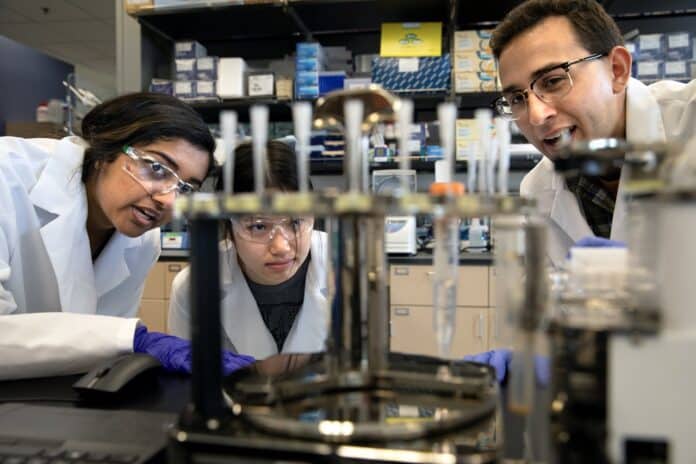Advancements in artificial intelligence (AI) can potentially revolutionize the field of microbial research. One notable breakthrough is the ability of AI to conduct a staggering number of microbial experiments each year. According to recent reports, AI has been able to run up to one million microbial experiments annually, a feat that was previously unimaginable.
A new AI system called BacterAI can conduct up to 10,000 independent scientific experiments per day, potentially driving a significant leap forward in the pace of discovery in fields ranging from medicine to agriculture to environmental science. BacterAI mapped the metabolism of two microbes associated with oral health with no prior baseline information. This platform helps scientists identify the specific nutrients required for microbial growth, leading to more efficient and effective treatments for various microbial diseases and conditions. The project was led by a team of researchers at the University of Michigan.
“We know almost nothing about most of the bacteria that influence our health. Understanding how bacteria grow is the first step toward reengineering our microbiome.” said Paul Jensen, U-M assistant professor of biomedical engineering who was at the University of Illinois when the project started.
Figuring out the amino acid combinations that promote bacterial growth is challenging, given that the 20 amino acids can result in over a million possible combinations. However, the BacterAI system was able to accurately discover the amino acid requirements for the growth of Streptococcus gordonii and Streptococcus sanguinis.
BacterAI tested hundreds of combinations of amino acids per day, refining its focus and adjusting the combinations based on previous results. Within nine days, it generated correct predictions 90% of the time. Unlike traditional methods that rely on labeled data sets, BacterAI creates its dataset through experiments, using the results to predict which new experiments would provide the most information. It discovered most of the bacterial feeding rules with fewer than 4,000 experiments.
Jensen said, “When a child learns to walk, they don’t just watch adults walk and then say ‘Ok, I got it,’ stand up and start walking. They fumble around and do some trial and error first.”
He also said, “We wanted our AI agent to take steps and fall, to come up with its ideas and make mistakes. Every day, it gets a little better, a little smarter.”
Conventional methods of researching bacteria are time-consuming and require significant resources, with about 90% of bacteria still needing to be studied. Automated experimentation can significantly accelerate the discovery process, with the team running up to 10,000 experiments in a day.
This type of AI trial and error can also be applied to other fields. According to lead author Adam Dama, the focused application of AI in projects like theirs will accelerate everyday research.
Without prior knowledge, the BacterAI system mapped the metabolism of two microbes associated with oral health – Streptococcus gordonii and Streptococcus sanguinis. The system tested hundreds of amino acid combinations daily to determine the specific nutrients required for bacterial growth. BacterAI created its dataset through a series of experiments, analyzing the results of previous trials to predict which new experiments would provide the most information.
Unlike traditional methods that rely on labeled data sets, BacterAI generates its dataset through experimentation.
The BacterAI system successfully mapped the metabolism of two microbes – Streptococcus gordonii and Streptococcus sanguinis – without prior knowledge. The system discovered the specific amino acid combinations necessary for bacterial growth by conducting hundreds of experiments each day.
Within nine days, the system produced accurate predictions 90% of the time, discovering most of the rules for feeding bacteria with fewer than 4,000 experiments. This method of AI experimentation has the potential to accelerate research across various fields beyond microbiology.
The BacterAI system has demonstrated the potential of using AI to map microbial metabolism without prior knowledge, thus accelerating the discovery process. The system conducted hundreds of experiments daily and identified specific amino acid combinations necessary for bacterial growth. This method of AI experimentation can potentially revolutionize research across various fields.
In summary, the ability of AI to run a million microbial experiments annually is a groundbreaking achievement that holds tremendous promise for the field of microbial research. With the help of AI-powered robotic systems, scientists can accelerate the pace of discovery, leading to more efficient and effective treatments for a range of microbial diseases and conditions.
The study was funded by the National Institutes of Health and received support from NVIDIA.
Journal Reference:
- Dama, A. C., Kim, K. S., Leyva, D. M., Lunkes, etal. BacterAI maps microbial metabolism without prior knowledge. Nature Microbiology. DOI: 10.1038/s41564-023-01376-0
